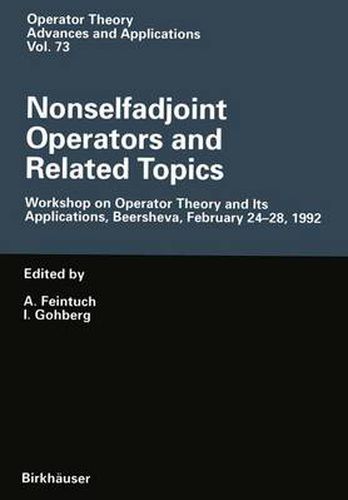Nonselfadjoint Operators and Related Topics: Workshop on Operator Theory and Its Applications, Beersheva, February 24-28, 1992

Nonselfadjoint Operators and Related Topics: Workshop on Operator Theory and Its Applications, Beersheva, February 24-28, 1992
This title is printed to order. This book may have been self-published. If so, we cannot guarantee the quality of the content. In the main most books will have gone through the editing process however some may not. We therefore suggest that you be aware of this before ordering this book. If in doubt check either the author or publisher’s details as we are unable to accept any returns unless they are faulty. Please contact us if you have any questions.
Our goal is to find Grabner bases for polynomials in four different sets of expressions: 1 x- , (1 - x)-1 (RESOL) X, 1 x- (1 - xy)-1 (EB) X, , y-1, (1-yx)-1 y, (1_y)-1 (1-x)-1 (preNF) (EB) plus and (1 - xy)½ (1 - yx )½ (NF) (preNF) plus and Most formulas in the theory of the Nagy-Foias operator model [NF] are polynomials in these expressions where x = T and y = T*. Complicated polynomials can often be simplified by applying replacement rules . For example, the polynomial (1 - xy)-2 - 2xy(1-xy)-2 + xy2 (1 - xy)-2 -1 simplifies to O. This can be seen by three applications of the replacement rule (1-xy) -1 xy -t (1 - xy)-1 -1 which is true because of the definition of (1-xy)-1. A replacement rule consists of a left hand side (LHS) and a right hand side (RHS). The LHS will always be a monomial. The RHS will be a polynomial whose terms are simpler (in a sense to be made precise) than the LHS. An expression is reduced by repeatedly replacing any occurrence of a LHS by the corresponding RHS. The monomials will be well-ordered, so the reduction procedure will terminate after finitely many steps. Our aim is to provide a list of substitution rules for the classes of expressions above. These rules, when implemented on a computer, provide an efficient automatic simplification process. We discuss and define the ordering on monomials later.
This item is not currently in-stock. It can be ordered online and is expected to ship in 7-14 days
Our stock data is updated periodically, and availability may change throughout the day for in-demand items. Please call the relevant shop for the most current stock information. Prices are subject to change without notice.
Sign in or become a Readings Member to add this title to a wishlist.


